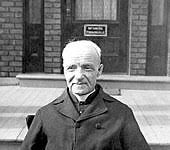“The Spirit of God who raised Jesus from the dead, . . . will give life to your mortal bodies.”[1] This is what we confess in the creed: “I believe in the resurrection of the body.” But why, I wonder, do we believe it? Cannot our souls enjoy the vision of God—or suffer in hell, if we die unrepentant—without a body? The answer to these questions takes us back into Old Testament times. The Jews had a very concrete understanding of what it means to be a human being. Not for them the Greek idea of a soul in the body somewhat like a sword in a sheath. For the Greeks, the purpose of life was to escape from the body, but the Jews had a different approach. For them I am my body. For instance, Moses said, “The life of the flesh is in the blood,”[2] that is to say, blood is the proof that I am alive. Cut me anywhere, from my toe to my head, and I shall bleed—unless, of course, I am dead; then the blood, i.e., the life is no longer active. If I am my body, there is no me without it.
The Jews, gradually over their history, developed the idea of a final judgement. They did so because they observed as we do, that evil men often, perhaps most often, flourish while the virtuous suffer. “God is just,” they knew, and so there had to be a final reckoning, at the end of the world (since it obviously did not occur in human history.). But if I am to be present, it must be in bodily form, since, as I say, “I am my body.” Hence the resurrection of the body is a consequence of their conviction that one day justice will be done, the good will be rewarded and the evil punished, and I shall be there to witness it. These facts tell us much about the significance of the resurrection of Jesus, but that is a topic that I shall leave to be explored next Easter.
[1] Rom 6.10-11.
[2] Lev 17.11.











